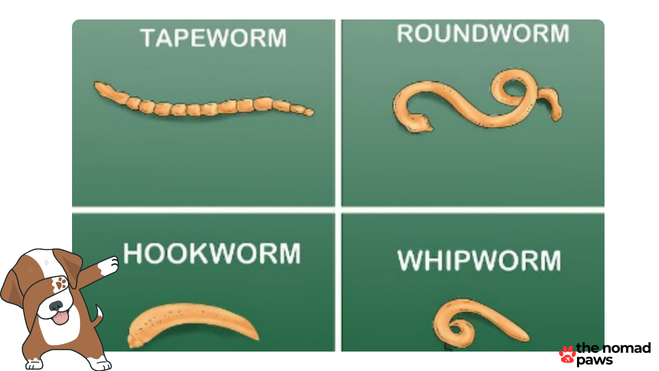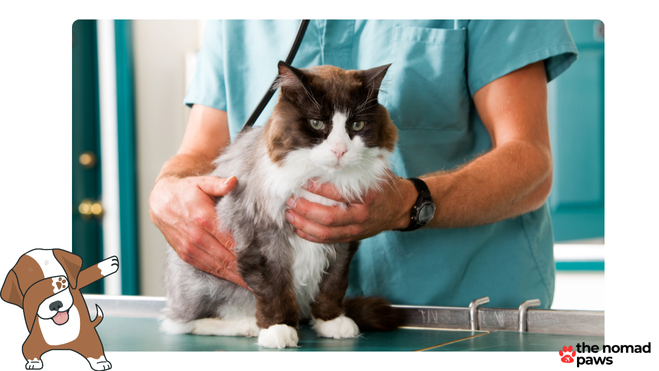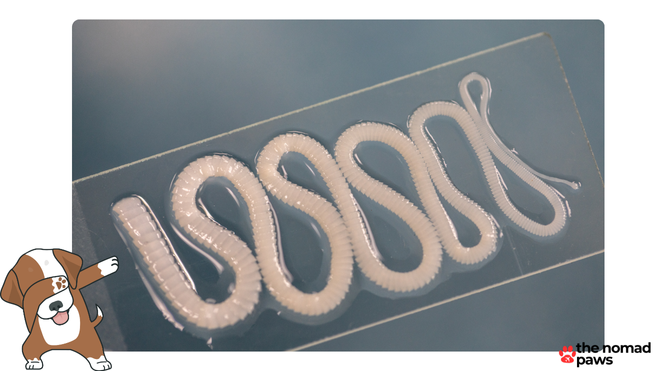Parasites are these little creatures that like to hang out on or inside another animal, munching on them to stay alive.
In cats and dogs, these pesky parasites are often found in their guts and go by the name of intestinal worms.
These worms can really mess with your pet’s digestion, make them uncomfortable, and even cause some pretty serious health issues if not dealt with.
Pets can catch these worms by drinking dirty water, playing in dirty soil, or even snacking on insects.
When they eat things that aren’t so clean, it gives these worms the perfect opportunity to set up camp inside them.
It’s super important to know what kinds of worms your pet might have, recognize the signs that they’re infected, and learn how to prevent and treat these annoying parasites in your furry pals.
Common Types of Worms and Symptoms

Intestinal worms, or parasitic helminths, come in different types and can cause various health problems. Here are some common types and their symptoms:
Roundworms: These worms are white or light brown and can grow up to 15 cm long. You might see them around the anus or in feces. They often cause a lack of growth, dull fur, and a swollen belly in pets like puppies and kittens.
Hookworms: These small, red-brown parasites attach to the intestines. In pets, they can lead to anemia and pneumonia due to their blood-sucking nature. They are often found in puppies and kittens.
Whipworms: These worms are long and thin. They can cause diarrhea, weight loss, and bloody stool. Even with a moderate infestation, symptoms might be mild.
Tapeworms: These worms look like flat ribbons and consist of segments filled with eggs. Tapeworms can irritate the stomach and disrupt digestion.
| Worm Type | Appearance | Symptoms |
|---|---|---|
| Roundworms | White/light brown, 15 cm long | Lack of growth, dull fur, fatty tummy |
| Hookworms | Small, red-brown | Anemia, pneumonia |
| Whipworms | Long, thin | Diarrhea, weight loss, blood in stool |
| Tapeworms | Flat ribbons | Stomach irritation, improper digestion |
These various worms can affect your pets and sometimes even you if you’re exposed to contaminated soil or infected animals. Keep an eye out for these signs and take steps to prevent infections.
Effective Deworming Treatments for Your Pets
Keeping your pets free from intestinal worms mostly involves making sure they get dewormed on a regular basis.
There are various types of deworming treatments to choose from, depending on what your pet requires.
Making sure your furry pals stay healthy means sticking to a routine of regular deworming treatments.
Dogs

Milbemax is a super handy deworming medication for dogs. It’s got two active ingredients, milbemycin oxime and praziquantel, that help tackle all sorts of intestinal parasites like roundworms, hookworms, whipworms, and tapeworms.
Plus, if you give it to your pup every month, it can even prevent heartworm disease.
Milbemax comes in tablet form, and you just pop it into your dog’s mouth with their food. The dosage depends on how much your furry friend weighs.
- Buy Milbemax ($9.89)
Panacur Worming Granules are a super popular and really effective deworming treatment for dogs. They’ve got this active ingredient called fenbendazole that does the trick.
These granules can take care of all sorts of internal parasites like roundworms, hookworms, whipworms, and some tapeworms. They don’t taste like much, so you can just mix ’em in with your dog’s food or give ’em a little treat to make sure they get the full dose.
You can use them for adult dogs as a regular dewormer, but they’re also safe for puppies over 2 weeks old, pregnant dogs, and even if your dog has something specific like Giardia or lungworm.
- Buy Panacur Worming Granules ($14.84)
Milprazon Worming Chewable is a broad-spectrum deworming medication for dogs that combines two active ingredients: milbemycin oxime and praziquantel.
This chewable tablet formulation is designed to be palatable, with studies showing that over 85% of dogs voluntarily consume the tablet.
Milprazon is effective against a wide range of internal parasites, including roundworms, hookworms, whipworms, tapeworms, and can also be used for the prevention of heartworm and lungworm infections.
- Buy Milprazon Working Chewable ($9.79)
Cats

Selehold is a generic version of Revolution, designed as a broad-spectrum parasiticide for cats.
This topical solution contains selamectin as its active ingredient, making it an economical alternative to the brand-name product.
Selehold is formulated to protect cats against both external and internal parasites, offering a comprehensive parasite control solution in a single monthly treatment.
The medication is effective against a wide range of parasites, including fleas, flea eggs, heartworms, ear mites, roundworms, hookworms, and chewing lice. It’s suitable for cats and kittens from 6 weeks of age and older.
- Buy Selehold ($26.62)
Triworm-C Dewormer is a broad-spectrum anthelmintic medication specifically formulated for cats and kittens. It contains two active ingredients: Praziquantel (20 mg) and Pyrantel pamoate (230 mg) per tablet.
This combination is effective against a wide range of internal parasites, including ascarids (roundworms), hookworms, whipworms, and tapeworms.
The dual-action formula allows Praziquantel to target the larval stages of worms, while Pyrantel pamoate combats adult worms.
One of the key advantages of Triworm-C is its versatility and ease of use. It can be administered directly or mixed with a small amount of food, and no fasting is required before treatment.
- Buy Triworm-C Dewormer for Cats ($9.79)
These treatments come in various forms like tablets, spot-on solutions, and chewables to suit different preferences.
Don’t Miss Our Top Resources for Pet Care!
Fleas Are Bad This Year: Stay ahead of the infestation with our latest tips and advice on dealing with fleas.
Best Tick Collar for Dogs: Ensure your furry friend stays protected with the top tick collars. Discover our recommendations.
Nexgard Plus Vs Simparica Trio: Compare these popular flea and tick treatments to find the best option for your pet.
Always consult a veterinarian to select a treatment suitable for your pet’s age, weight, and any existing health conditions. This helps you administer the right medication effectively and safely.
Dietary and Natural Remedies
Improving your pet’s diet can also serve as a preventative measure against worms. Adding certain fruits and vegetables can help support their gut health.
Raw carrots, squash, papaya, and pumpkin are good options to include in their meals.
Natural dewormers like coconut oil, cloves, and probiotics can also be beneficial.
Probiotics assist in maintaining a healthy balance of gut bacteria, making it harder for parasites to thrive. Regular use of these natural remedies can work alongside traditional treatments to keep your pet’s intestinal health in check.
Clean Environment
Environmental management plays a significant role in preventing intestinal worms. Keep outdoor areas clean and free of feces to minimize the risk of contamination.
Avoid letting your pets interact with wildlife that may carry parasites. Regularly clean their bedding and toys to maintain a hygienic environment that supports good health.
Boosting Immunity
Improving your pet’s immune system can also help in the fight against intestinal worms.
A healthy diet rich in nutrients is vital for this. Vitamins and minerals, found in a balanced diet, can strengthen the immune system, making your pet less susceptible to parasitic infections.
Consulting Your Veterinarian
Always involve your veterinarian when it comes to your pet’s deworming schedule. They can recommend the best products and treatment plans tailored to your pet’s needs.








